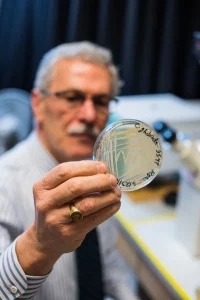
Podcast: Play in new window | Download
This week’s guest is Professor Mahmoud Ghannoum. For over four decades, Dr. Ghannoum has been exploring a critical but neglected inhabitant of the human body, the fungus. Born and raised in Lebanon, Dr Mahmoud Ghannoum is the current Director of the Center for Medical Mycology at Case Western Reserve University. He began his scientific journey at Loughborough University in England where he studied the fungus candida and its health associated diseases. Coupling this work to his curiosity about the whole area of intestinal microorganisms in the human body, he has become one of the leading researchers in the world in this space.
His discoveries include the knowledge that fungal organisms constitute an essential part of the microbiome. In fact, in 2010, Dr Ghannoum was the first scientist to identify over 100 native species of fungi in the oral cavity and that they are mostly friendly to us. Like with bacteria, there are good fungi as well as bad fungi. And just as it was startling to discover that we need positive bacteria in our guts, most people today are shocked to learn that their health depends on flourishing colonies of helpful fungi. Symbiosis in all things seems to be the flavor of the day and history has proven this to be what we should have always assumed.
He is widely published in top journals as well as being the founder and director of Biohm, a company dedicated to microbiome analysis and management from the perspective of fungal and bacterial communities. He is the author of Total Gut Health. This week, Dr. Ghannoum and I look critically at the microbiome of humans from the well trafficked bacterial road to the less travelled fungal road.
Enjoy,
Dr. M












